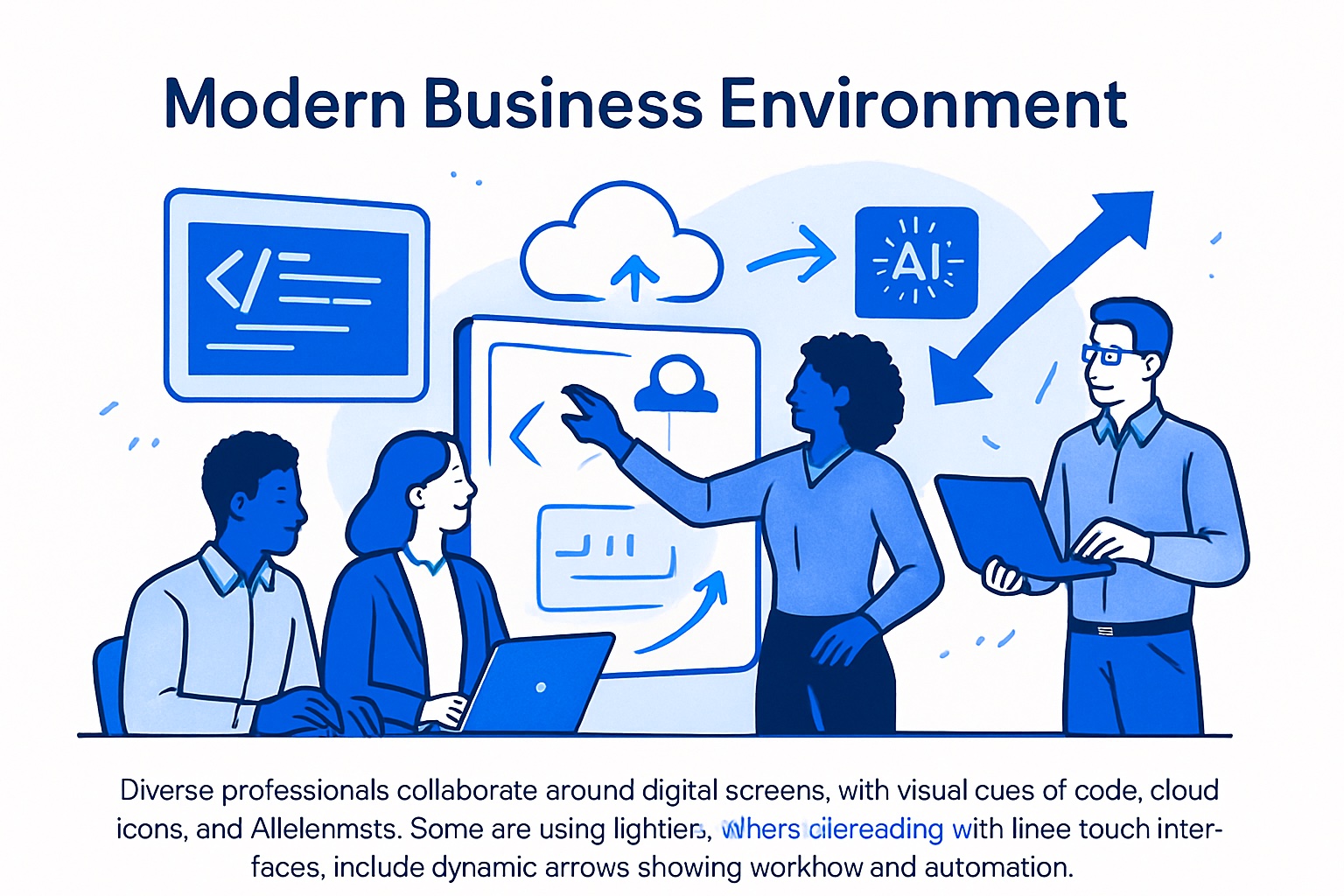In today’s fast-paced digital landscape, choosing the right business soft solutions can make or break your company’s success in 2025. With technology evolving rapidly and teams working across borders, the demand for powerful, integrated platforms has never been higher. This article uncovers the 7 best business soft solutions designed to boost productivity, streamline collaboration, and fuel growth. Whether you’re seeking project management, accounting, CRM, or all-in-one systems, you’ll discover in-depth features, pricing, pros and cons, and ideal use cases—helping you confidently select the best fit for your business.
What Are Business Soft Solutions?
In today’s digital era, the term “business soft solutions” is gaining traction among forward-thinking organizations. But what does it really mean, and why does it matter so much for 2025?
Definition and Scope
Business soft solutions refer to software platforms specifically designed to streamline business operations, automate everyday workflows, and enhance team collaboration. These solutions can range from comprehensive all-in-one platforms to specialized tools focusing on key functions like project management, CRM, or accounting.
All-in-one platforms offer a unified hub for multiple business processes, while specialized tools provide targeted features for specific needs. Both types of business soft solutions play a vital role in modern business ecosystems, ensuring companies stay agile, organized, and competitive.
No matter the size or industry, businesses rely on business soft solutions to connect teams, manage data, and drive their goals forward. The keyword “business soft solutions” captures this broad yet essential spectrum of digital tools.
Why Businesses Need Soft Solutions in 2025
The business landscape is evolving rapidly, with increasing operational complexity and a shift toward remote and hybrid work models. Companies need business soft solutions to automate tasks, enable seamless integrations, and scale as they grow.
Automation and integration are no longer optional; they’re essential for staying efficient and competitive. Recent SaaS Market Growth Statistics reveal that companies using integrated management software report productivity gains of up to 30%. This highlights the growing reliance on business soft solutions for adapting to market changes and making data-driven decisions.
In 2025, choosing adaptable and scalable business soft solutions is a strategic move, not just a technical upgrade.
Key Features to Look For
When evaluating business soft solutions, there are a few must-have features that set top platforms apart:
- Customization and flexibility: Adapt to unique workflows and processes.
- Seamless integration: Connect with CRM, accounting, HR, and other essential systems.
- User-friendly interfaces: Encourage adoption through intuitive design and mobile access.
- Security and compliance: Protect sensitive data and meet regulatory standards.
- Scalability: Grow with your business, adding users and modules as needed.
Selecting business soft solutions with these features ensures your company remains productive, secure, and future-ready.
Real-World Example
Consider a mid-sized agency struggling with scattered workflows and manual processes. By adopting an all-in-one business soft solution, they automated project tracking, centralized client communications, and integrated financial reporting.
Within months, the agency saw a significant boost in efficiency and a noticeable reduction in operational costs. Team members collaborated more easily, management gained clearer insights, and clients experienced faster turnaround times.
This real-world success story demonstrates how business soft solutions can transform operations, proving their value far beyond simple software upgrades.
How to Choose the Right Business Soft Solution
Selecting the right business soft solutions can feel overwhelming, given the sheer range of options available in 2025. The best approach is to break down your decision process into clear, actionable steps. This ensures your investment delivers maximum value and fits your organization’s needs today and tomorrow.
Assessing Business Needs and Objectives
Start by mapping out your company’s most pressing challenges. Are you struggling with project tracking, client management, or financial oversight? Pinpointing these pain points helps you focus on business soft solutions that target your unique requirements.
Align potential solutions with your strategic objectives. Whether your primary goal is rapid growth, improved efficiency, or regulatory compliance, ensure the platforms you consider support these ambitions. This groundwork increases the odds of long-term success.
Evaluating Features and Integrations
Features and integrations can make or break your experience with business soft solutions. Look for platforms that connect seamlessly with your current ecosystem—think Slack, Google Workspace, or QuickBooks. Automated workflows and robust analytics are also crucial for efficiency.
For enterprises exploring no-code options, it’s wise to consult expert resources like Choosing the right no-code platform to ensure the platform matches your technical and business requirements.
Scalability and Flexibility
Your business soft solutions should not only address present needs but also scale as you grow. Check if the software can expand with additional users, new modules, or advanced features. The ability to adapt to evolving business models is a must.
Flexibility matters, too. Opt for solutions that allow customization, so your workflows and processes aren’t boxed in as your company changes direction.
Budget and ROI Considerations
Budget is a key factor in choosing business soft solutions. Compare subscription-based services versus one-time purchases, factoring in extra costs for implementation, training, and support.
Calculate potential ROI. Many organizations have realized substantial savings—sometimes in the millions—by optimizing software adoption. Prioritizing value over price ensures your investment pays off over time.
User Experience and Adoption
Even the most powerful business soft solutions fall flat if your team doesn’t use them. Prioritize intuitive interfaces and clear navigation to encourage adoption across all departments.
Check if the vendor offers onboarding resources, training materials, and responsive customer support. A smooth rollout leads to faster productivity gains and happier employees.
Security and Compliance
Data protection should be a top priority. Evaluate each solution’s security features, including encryption, regular audits, and compliance with standards like GDPR or SOC 2.
A real-world example: One company avoided costly data breach penalties by selecting a business soft solutions provider with industry-standard compliance certifications. This peace of mind is invaluable.
Example Decision Matrix
Below is a sample decision matrix to help compare leading business soft solutions on key criteria:
| Solution | Features | Integrations | Scalability | Price | Support |
|---|---|---|---|---|---|
| Big House | Custom/AI/no-code | High (API-rich) | Enterprise-ready | Custom quote | Dedicated |
| Zoho One | All-in-one suite | Extensive | SMB to enterprise | $37/user/mo | 24/7 |
| Smartsheet | Project-centric | Moderate | Team to enterprise | $7/user/mo | Email/chat |
| FreshBooks | Accounting focus | Limited | SMBs | $9.50/mo | Phone/email |
| ClickUp | Highly customizable | Wide | All sizes | $7/user/mo | Chat/email |
| Trello | Kanban/simple | Good (Power-Ups) | SMBs | $5/user/mo | Community |
| Asana | Project/task mgmt | Strong | Teams to enterprise | $10.99/user/mo | Chat/email |
This structured approach will help you confidently select business soft solutions that align with your goals, budget, and future growth plans.
7 Best Business Soft Solutions for 2025
Businesses seeking the best business soft solutions in 2025 face a crowded landscape. The right choice can transform productivity, streamline collaboration, and accelerate growth. Below, we spotlight the top seven business soft solutions leading the way this year. Each platform is tailored to meet evolving needs—whether you’re a startup building an MVP or an enterprise optimizing operations. Explore their features, pricing, and unique advantages to discover which business soft solutions align with your goals.
Big House Technologies
Big House Technologies is redefining business soft solutions for 2025 with a unique blend of no-code development and AI integration. Their flexible pricing includes Basic (for MVPs), Growth (for rapid scaling), and Enterprise (custom solutions), with detailed quotes available upon request.
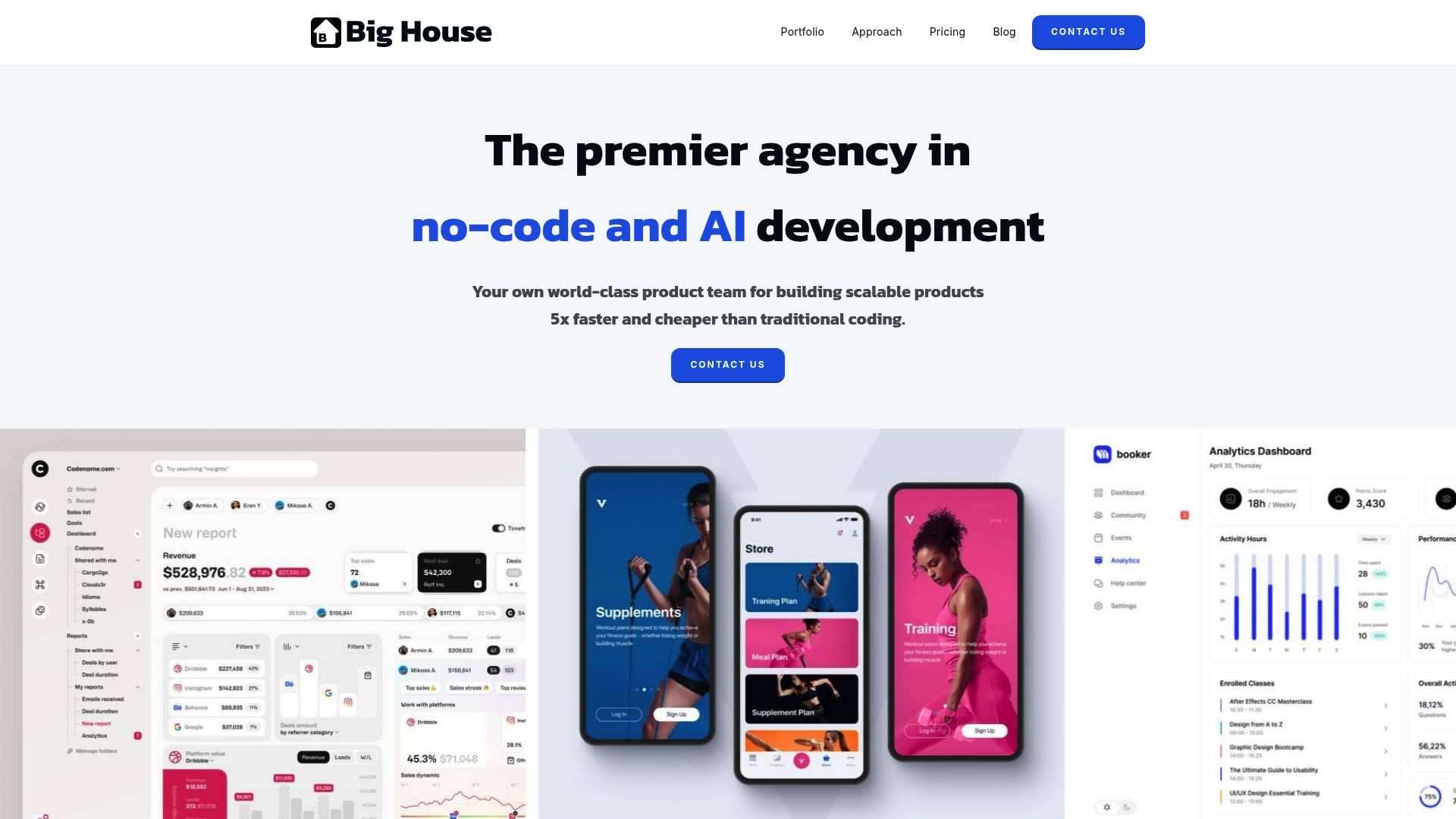
Key features at Big House Technologies include:
- No-code and low-code software builds
- Advanced AI integrations
- Custom internal tools
- MVP development
- UI/UX design
- Rigorous QA and testing
Clients enjoy rapid development—up to five times faster than traditional builds—plus significant cost savings. Some report up to 2 million euros saved by adopting their business soft solutions. The end-to-end product team ensures user-centric design and seamless delivery.
Big House is ideal for startups needing fast MVPs, enterprises digitizing workflows, and leaders seeking scalable digital products. Pros include speed, cost-efficiency, deep no-code/AI expertise, and a transparent, collaborative process. The main con: it’s best suited for custom builds, so off-the-shelf seekers may look elsewhere.
What sets them apart? Big House combines enterprise-grade quality with lightning-fast no-code speed. For a deeper look at why no-code platforms are revolutionizing business software, check out No-code solutions for enterprises.
Zoho One
Zoho One stands out as a comprehensive all-in-one suite among business soft solutions, designed to unify every aspect of your organization. Pricing starts at $37/month/user, with flexible plans and a free trial to get you started.
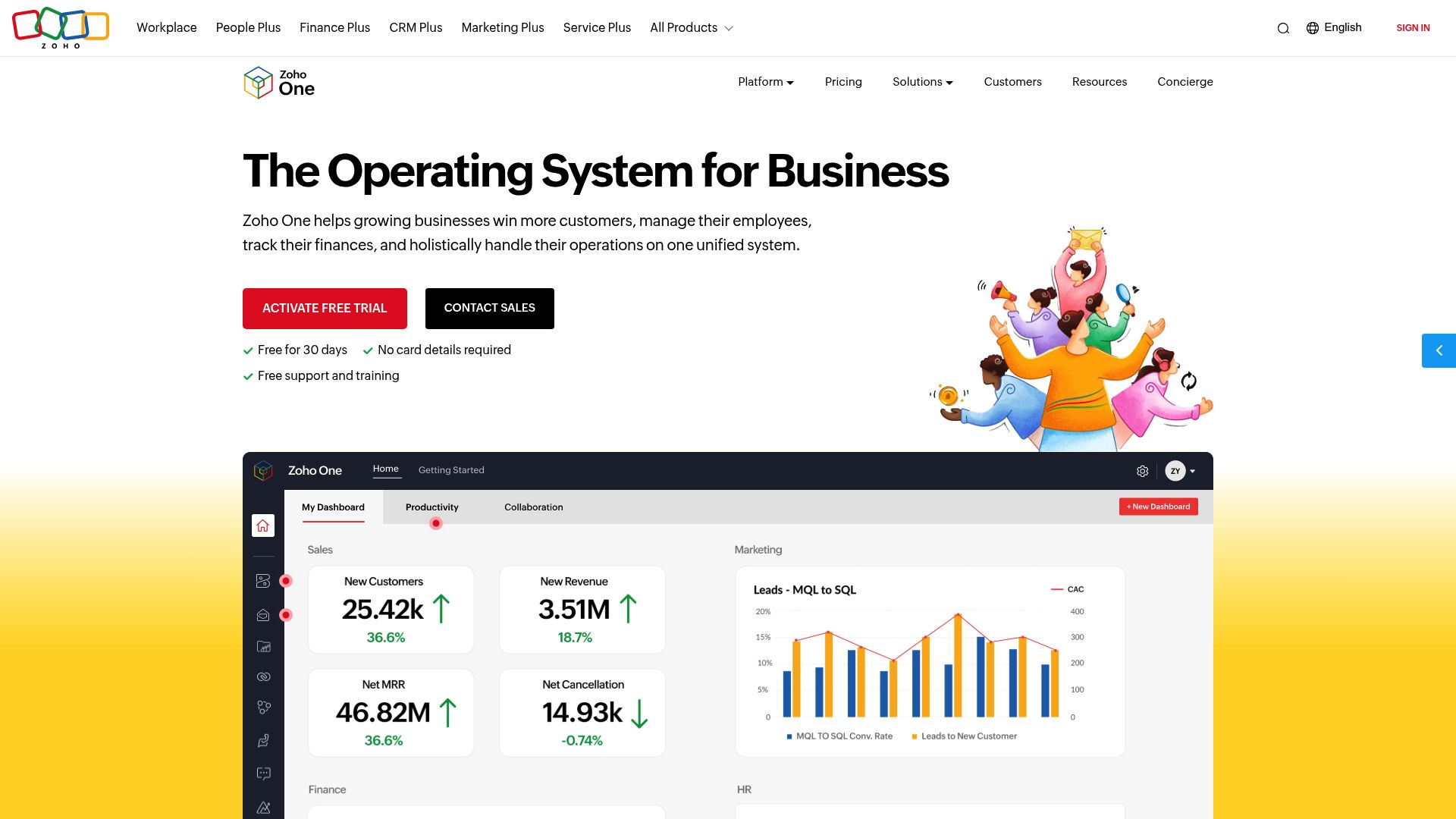
This platform bundles 40+ integrated business apps, including CRM, project management, HR, finance, and advanced analytics. AI-powered automation delivers actionable insights, helping you work smarter and faster.
The biggest advantage of Zoho One is its seamless integration. It connects sales, support, accounting, and HR into a single ecosystem, eliminating data silos. Robust reporting and workflow automation drive efficiency.
Zoho One is perfect for SMBs and mid-sized businesses seeking unified management tools. Pros include comprehensive coverage, scalability, and better value compared to piecemeal software. The learning curve can be steep, especially for teams new to integrated business soft solutions. Additionally, some specialized needs may require third-party apps.
The unique selling point: Zoho One’s native integration streamlines every department, making it a one-stop shop for ambitious businesses.
Smartsheet
Smartsheet brings a familiar spreadsheet-style interface to modern project management, making it a favorite among business soft solutions for 2025. Pricing starts at $7/month/user, with Pro, Business, Enterprise, and Advanced Work Management plans.
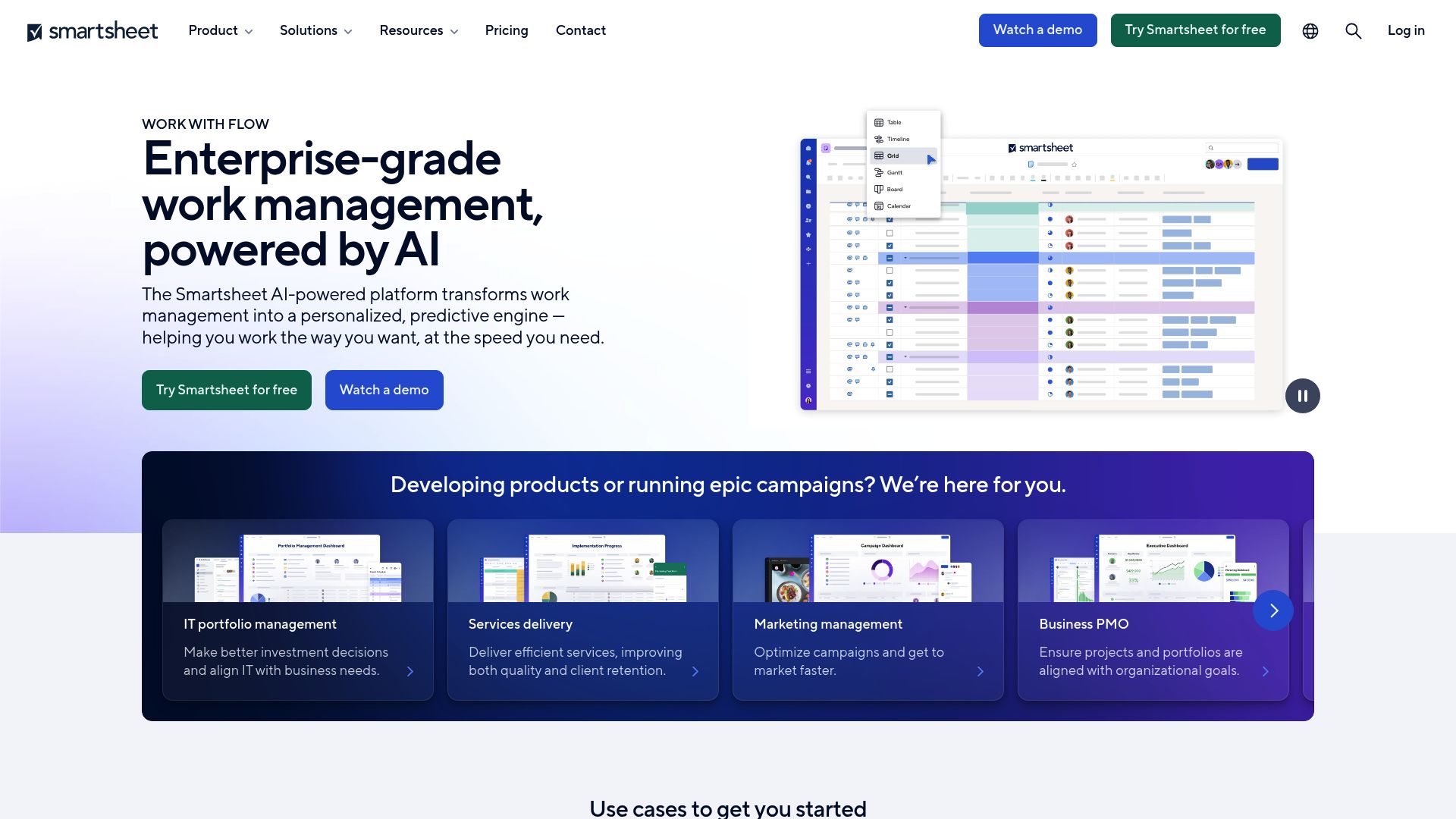
Smartsheet’s core features include:
- Grid, Gantt, and Calendar project views
- Workflow automation
- Resource management
- Customizable dashboards
- Advanced reporting
Its Excel-like feel makes onboarding easy for teams transitioning from spreadsheets to more robust business soft solutions. Automation and reporting tools help manage complex projects without overwhelming users.
Smartsheet is ideal for teams running multi-stage projects or handling lots of data. Pros: flexibility, powerful automation, and detailed reporting. Cons: It can be excessive for simple to-do lists, and some advanced features require pricier plans.
What makes Smartsheet unique is its balance of familiar usability with enterprise-grade project management power, helping teams bridge the gap between traditional spreadsheets and advanced business soft solutions.
FreshBooks
FreshBooks is a leader in accounting-focused business soft solutions tailored for freelancers and small businesses. Pricing starts at just $9.50/month, with Lite, Plus, Premium, and Select plans, all offering a free trial.
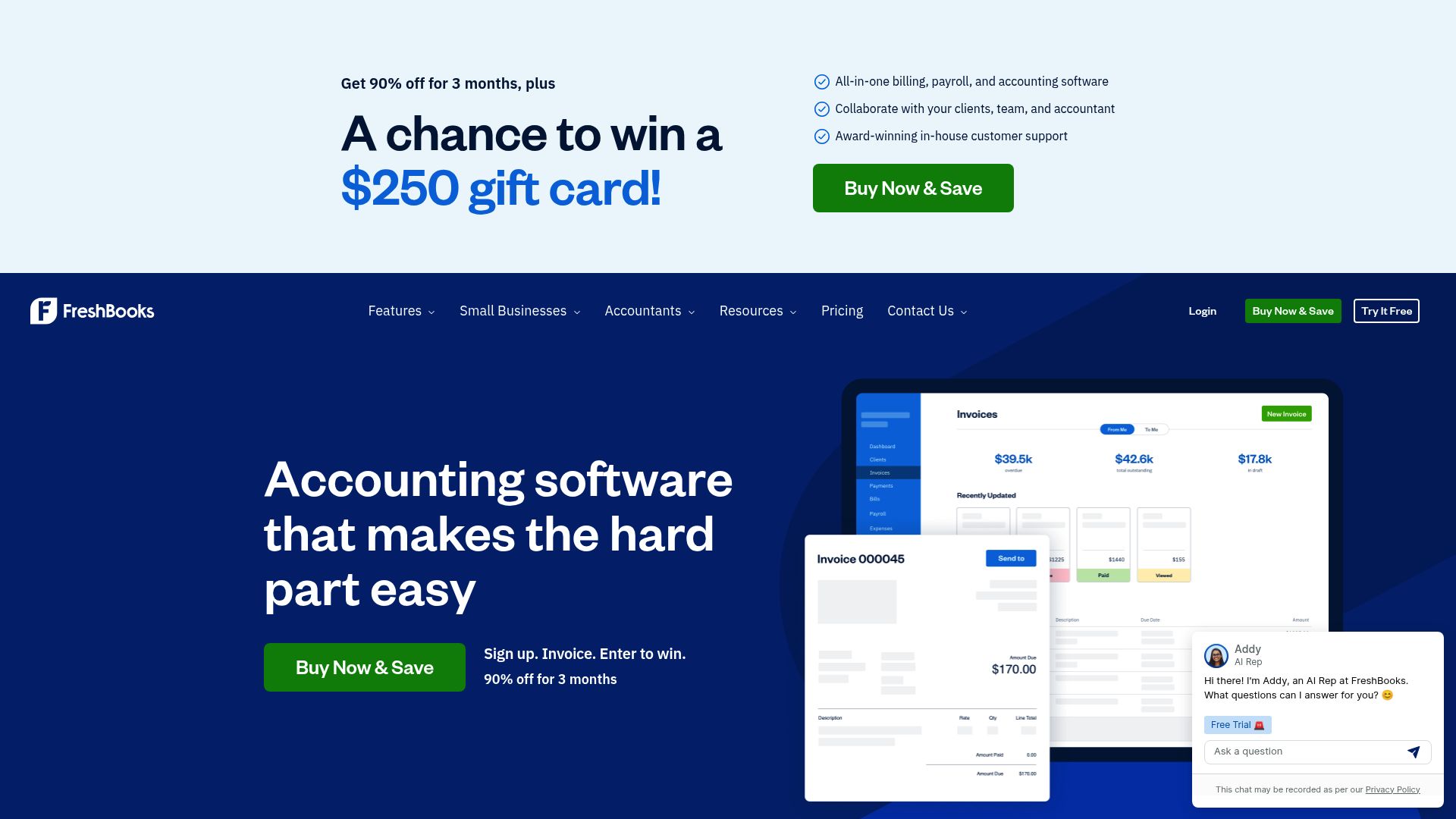
Key features include:
- Simple invoicing and expense tracking
- Time tracking and financial reporting
- Client project management
- Mobile access for on-the-go updates
FreshBooks excels at simplifying billing and bookkeeping for small teams. Its intuitive interface means you spend less time on admin and more on growing your business. For those seeking scalable business soft solutions, FreshBooks is best suited to smaller operations.
Pros: user-friendly, affordable, and backed by responsive customer support. Cons: It offers limited scalability for larger enterprises and has fewer integrations compared to all-in-one competitors.
The standout feature? FreshBooks delivers unbeatable simplicity in small business accounting, making it a go-to for those prioritizing ease of use.
ClickUp
ClickUp has rapidly become a favorite among teams searching for highly customizable business soft solutions. With pricing from $7/month/user (plus a robust free plan), ClickUp offers Unlimited, Business, and Enterprise tiers.
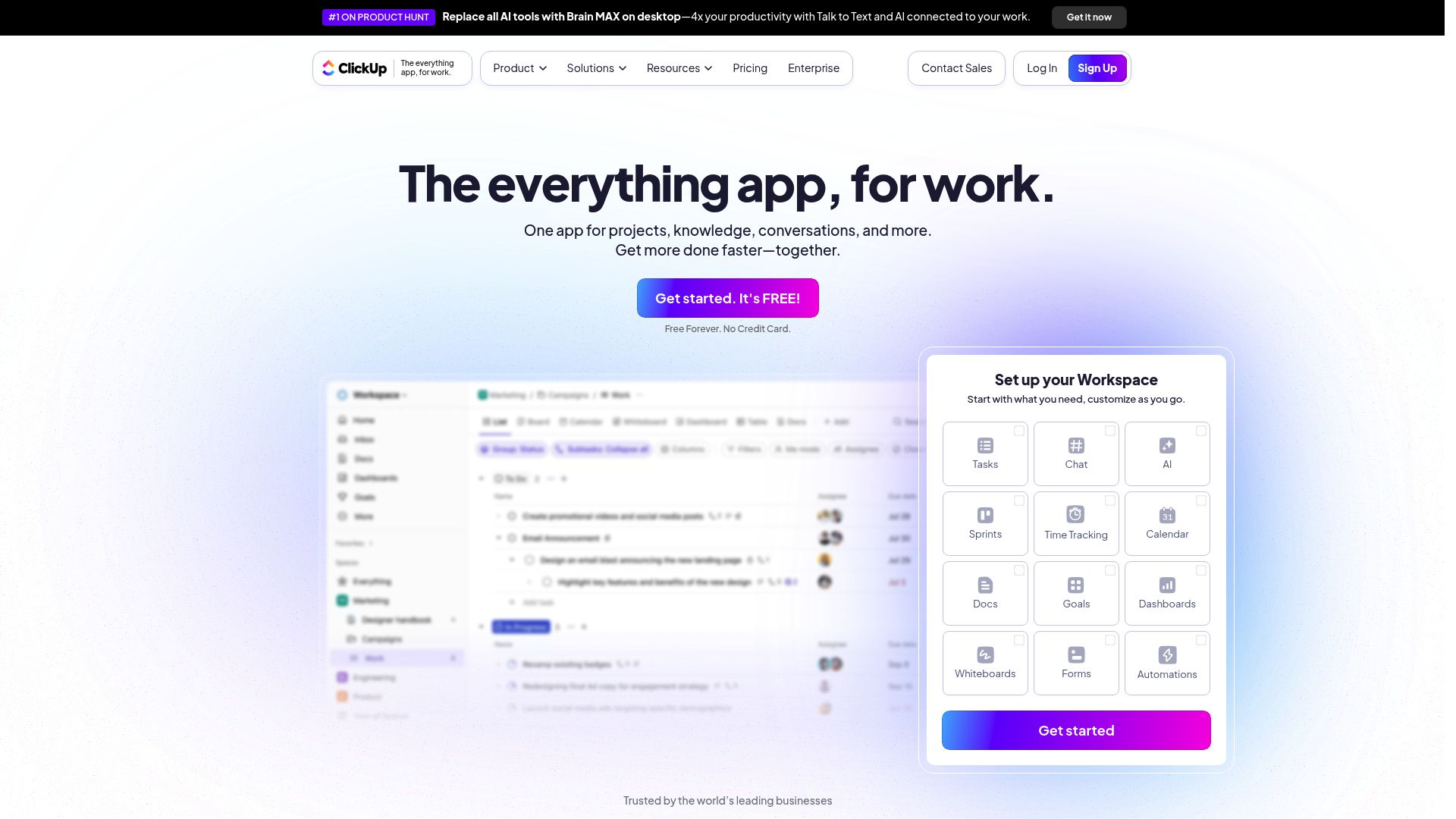
The platform covers:
- Task and project management
- Goal setting and tracking
- Customizable whiteboards
- Document collaboration
- Built-in chat and automation
What sets ClickUp apart is its flexibility. You can tailor workflows to fit Agile, Kanban, or List methodologies—ideal for teams with diverse needs. Business soft solutions like ClickUp empower remote teams to collaborate seamlessly.
Pros: extreme customization, affordable pricing, and powerful automation. Cons: With so many features, the interface can feel cluttered, and the learning curve is noticeable.
ClickUp’s unique selling point is its ability to mold to any workflow, making it a highly adaptable choice for fast-changing teams.
Trello
Trello is known for its simplicity and visual approach among business soft solutions. Starting at $5/month/user, Trello offers Free, Standard, Premium, and Enterprise plans to fit any team size.
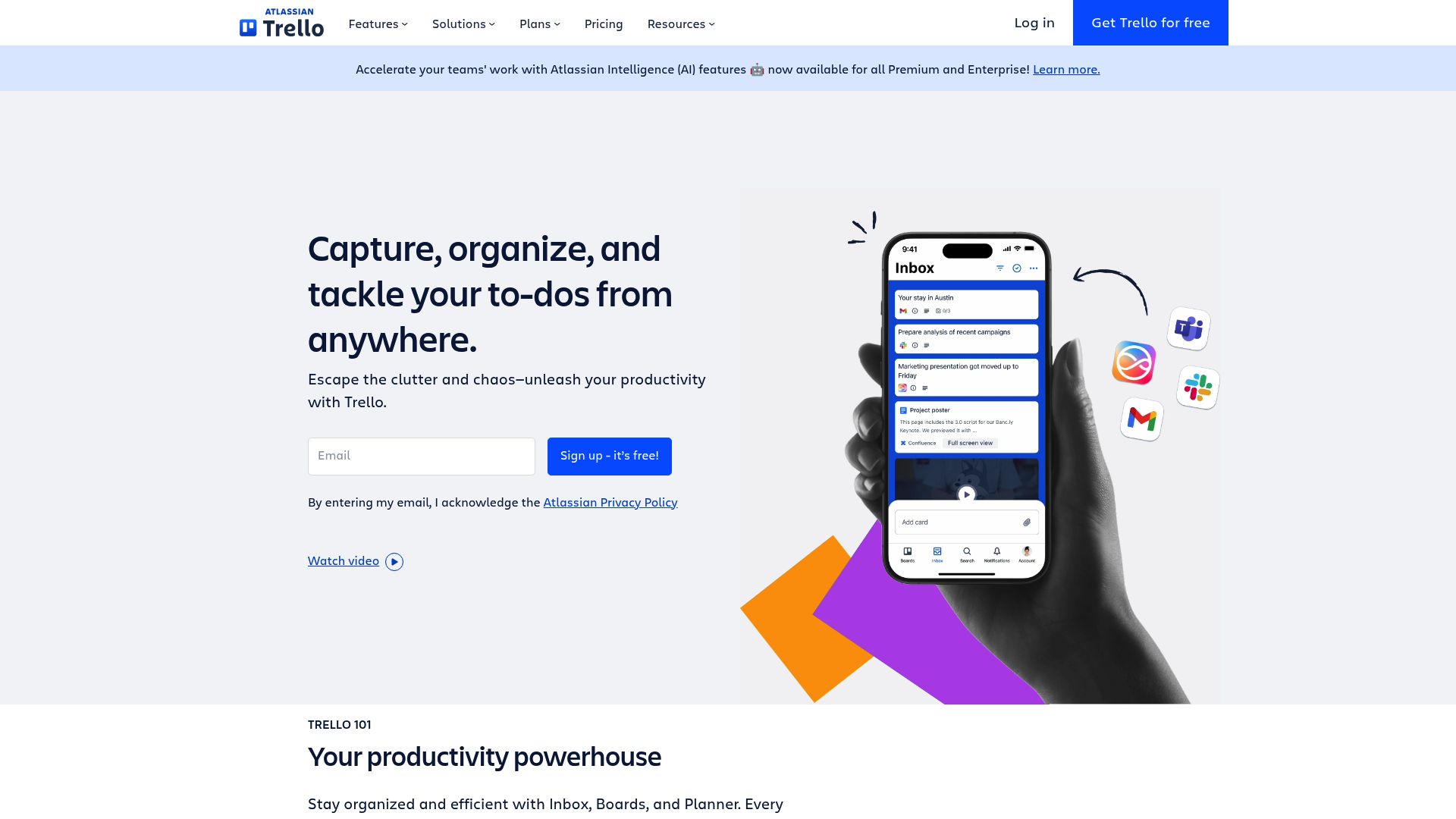
Core features include:
- Kanban boards with drag-and-drop tasks
- Power-Ups for integrations (e.g., Slack, Google Drive)
- Built-in automation
- Collaboration tools for teams
Trello shines in visual workflow management. It’s perfect for small teams needing straightforward task tracking without a steep learning curve. Business soft solutions like Trello are often the first step for companies moving away from email and spreadsheets.
Pros: intuitive design, flexibility, scalability via Power-Ups. Cons: reporting and analytics are limited, and it’s less suitable for managing complex projects.
Trello’s unique value lies in its visual simplicity—making team collaboration easy and effective.
Asana
Asana remains a top contender in business soft solutions for structured task and project management. Pricing starts at $10.99/month/user, with a free forever plan and several paid tiers: Personal, Starter, Advanced, Enterprise, and Enterprise+.
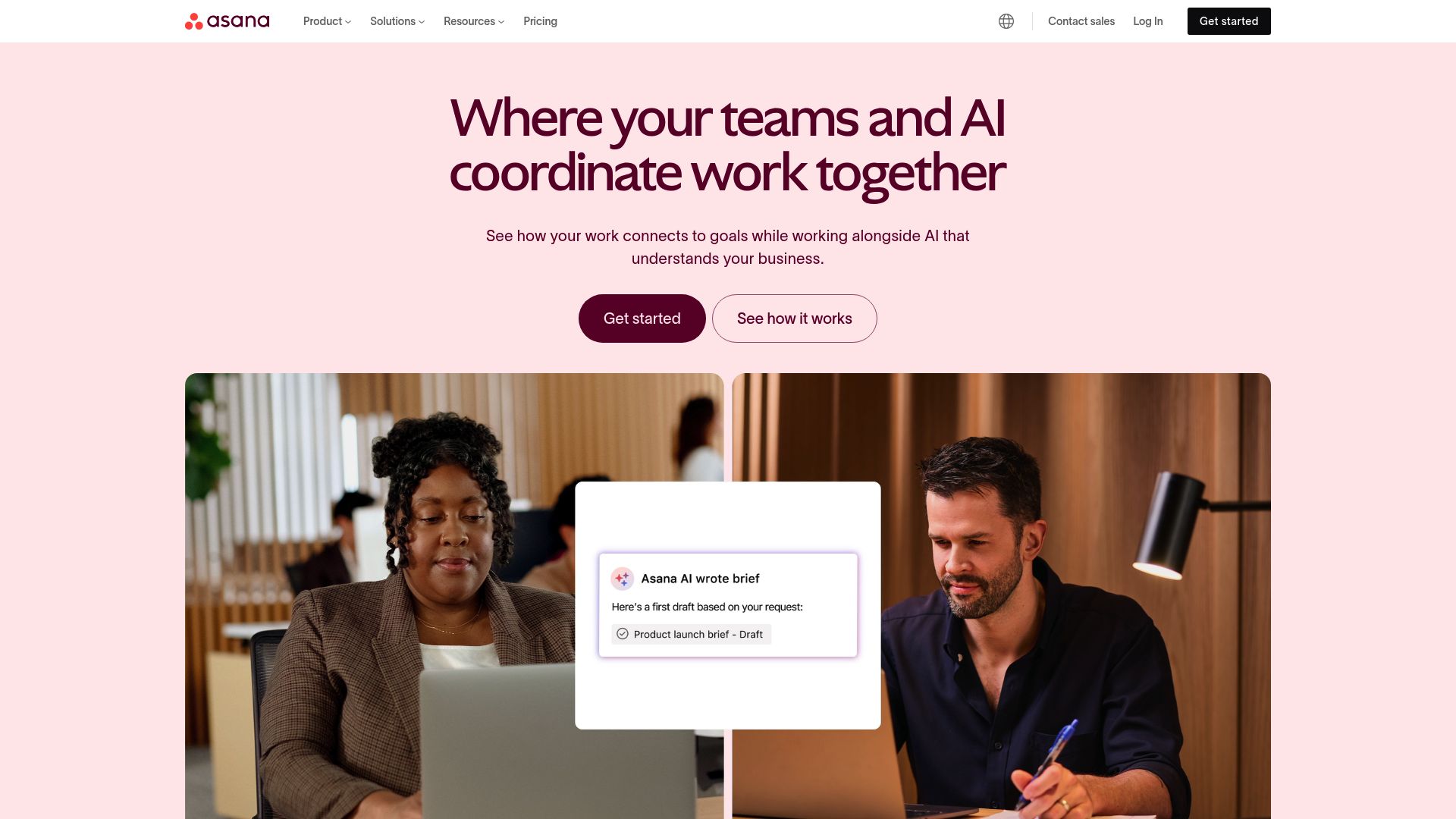
Asana’s core features:
- Task tracking and assignment
- Workflow builder
- Timeline and calendar views
- Team collaboration and messaging
- Diverse integrations
Asana helps teams assign, track, and complete work with transparency. Its intuitive interface and collaboration tools make it suitable for companies of all sizes seeking powerful business soft solutions.
Pros: intuitive UI, strong collaborative features, and scalability. Cons: advanced features require higher-tier plans, and costs can add up for larger organizations.
Asana’s unique selling point is its balance of simplicity and power—ideal for growing teams that need structured yet flexible project management.
Comparing the Top Business Soft Solutions
Choosing between the leading business soft solutions can feel overwhelming with so many features and price points. To simplify your decision, we’ve compared these platforms side by side, highlighting what sets each apart and where they shine.
Feature Comparison Table
Below is a quick snapshot of the core features, pricing, scalability, and support for each of the top business soft solutions:
| Solution | Starting Price | Core Features | Integrations | Scalability | Support |
|---|---|---|---|---|---|
| Big House Tech | Custom | No-code, AI, custom builds | API, custom | High | Dedicated team |
| Zoho One | $37/user/month | All-in-one suite, automation | 40+ native | Strong | 24/7 support |
| Smartsheet | $7/user/month | Project mgmt, automation | 100+ | Flexible | Email, chat |
| FreshBooks | $9.50/month | Invoicing, accounting | Limited | SMB focused | Live support |
| ClickUp | $7/user/month | Task mgmt, docs, chat | 1000+ | Enterprise-ready | 24/7 support |
| Trello | $5/user/month | Kanban, Power-Ups | 200+ Power-Ups | SMB to Enterprise | Community, chat |
| Asana | $10.99/user/month | Task, workflow, timeline | 200+ | Highly scalable | Email, chat |
Each business soft solutions platform offers unique strengths, so consider which features align best with your business needs.
Suitability Matrix
To help match business soft solutions to your specific context, here’s a quick guide:
- Big House Technologies: Ideal for startups and enterprises needing custom, scalable digital products.
- Zoho One: Best for SMBs/mid-sized businesses seeking unified management.
- Smartsheet: Great for teams transitioning from spreadsheets to complex project management.
- FreshBooks: Perfect for freelancers and small service businesses focused on accounting.
- ClickUp: Suited for remote teams needing highly customizable workspaces.
- Trello: Fits small teams or those who prefer visual task management.
- Asana: Works for any size team needing structured, scalable task and project management.
Choosing the right business soft solutions depends on your company size, industry, and workflow needs.
Integration and Ecosystem Analysis
Strong integration capabilities are a must for business soft solutions in 2025. Platforms like Zoho One and ClickUp offer robust app marketplaces and open APIs, making it easy to connect with tools like Google Workspace, Slack, and QuickBooks.
For a deeper dive into integration trends and must-have features, explore this Software guide for 2025. The best business soft solutions ensure your workflows remain seamless as your tech stack evolves.
User Ratings and Industry Recognition
User reviews and industry awards further separate leading business soft solutions. Platforms like Asana and Zoho One consistently score above 4.5 stars on G2, with users praising ease of use, automation, and support.
Case studies highlight productivity gains and ROI—companies regularly report up to a 30% boost after adoption. Ultimately, the best business soft solutions deliver proven results, strong support, and a track record of recognition in the industry.
2025 Trends in Business Software Solutions
The landscape of business soft solutions is rapidly evolving in 2025, driven by innovation and changing workplace demands. Companies are reimagining operations, seeking tools that not only automate but also adapt to new realities.
AI and Automation Take Center Stage
Artificial intelligence is becoming a core part of business soft solutions. Platforms now offer smart workflow automation, predictive analytics, and AI-driven customer service. According to AI Integration in Business Operations, companies leveraging these features are streamlining tasks and making more informed decisions.
No-Code and Low-Code Revolution
The rise of no-code and low-code platforms empowers non-technical teams to build custom apps and automate internal processes. This shift accelerates digital transformation and boosts agility. For a deeper dive into these advantages, see the key benefits of internal tool development.
API-First and Seamless Integrations
Modern business soft solutions prioritize open APIs and integrations, enabling a unified workflow across CRM, HR, and accounting systems. This connectivity is now essential for eliminating data silos.
Remote and Hybrid Work Enablement
With distributed teams becoming the norm, cloud access, mobile functionality, and real-time collaboration are top priorities. Platforms are designed to connect remote workers and foster productivity from anywhere.
Security, Compliance, and Scalability
Businesses face stricter data privacy regulations, so robust security and compliance features are non-negotiable. Meanwhile, modular and scalable solutions ensure companies can adapt as they grow.
The impact? Companies adopting these 2025 trends in business soft solutions are experiencing faster time-to-market, greater cost efficiency, and noticeable productivity gains.
With so many powerful business solutions to choose from, it’s clear that the right tools can make all the difference in streamlining your operations and scaling your ideas faster than ever. If you’re excited to put these insights into action and want to see real-world results, you don’t have to wait months to get started. Imagine launching your MVP in just weeks—without the traditional tech headaches. Ready to turn your vision into a working product sooner rather than later? Launch Your MVP in Weeks, Not Months and see how quickly you can move from idea to impact.




About Big House
Big House is committed to 1) developing robust internal tools for enterprises, and 2) crafting minimum viable products (MVPs) that help startups and entrepreneurs bring their visions to life.
If you'd like to explore how we can build technology for you, get in touch. We'd be excited to discuss what you have in mind.
Other Articles
Discover the best chat gpt apps for 2025 to boost productivity and creativity Compare features pricing and tips to find your ideal AI chat companion today
Discover the 7 top product software solutions for 2026 to streamline operations, boost collaboration, and drive business growth. Choose the best fit for your goals.
Discover the latest software testing best practices and trends for 2025. Learn how automation, AI, and modern strategies can enhance software quality and reliability.

